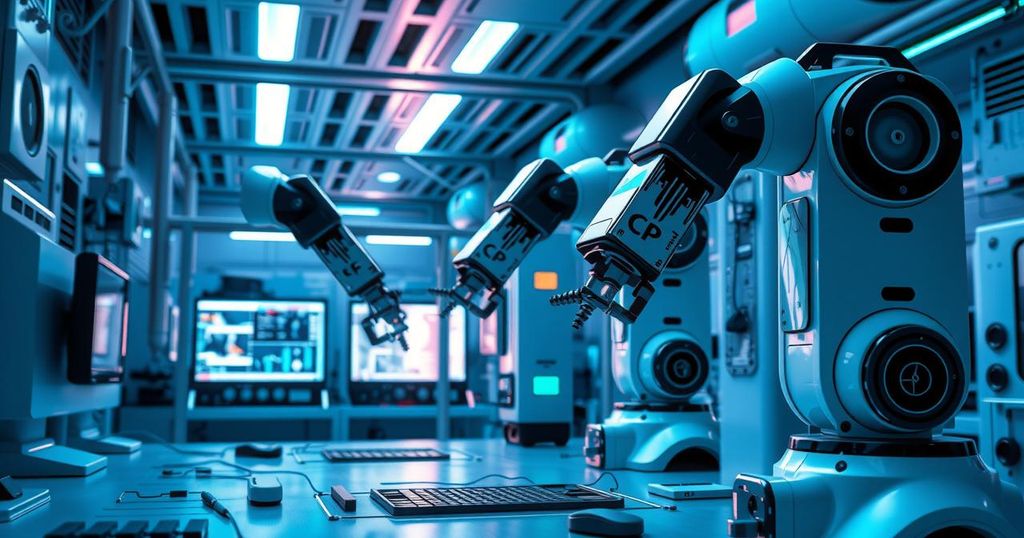The Robotic and AI Revolution in Drug Discovery
Artificial Intelligence and robotics are revolutionizing drug discovery by cutting costs, speeding up processes, and enhancing the potential for personalized medicines. Technologies like AlphaFold and automated labs are key players in this transformation, though challenges remain regarding AI model transparency and regulatory adaptations.
As the world grapples with the logistics of bringing new treatments to patients, it’s become clear that artificial intelligence (AI) and robotics are key players in reshaping drug discovery. These technologies promise a future where drug development is faster, cheaper, and possibly even safer, thanks to smarter predictive models and automation. Significantly, they help tackle the notorious inefficiencies that have plagued the industry for decades, aiming for more rapid breakthroughs.
Traditionally, developing a new drug has been a formidable task. It can take upwards of 12 to 15 years and expects massive investments—around $2.8 billion typically just to bring one new drug to market. The process starts with identifying therapeutic targets related to diseases, then moving on to screening vast libraries of potential compounds. Despite painstaking preclinical testing, a staggering number of candidates fall short, particularly during human trials where they may reveal unforeseen issues.
The COVID-19 pandemic was a real wake-up call, highlighting how crucial it is to accelerate drug development. Revolutionary technologies, like AI, were essential in validating targets and screening compounds, although progress has been sluggish. The challenges of incomplete data and biological complexity become evident, stressing an urgent need for innovative approaches. And that’s exactly where AI and robotics come in.
In the lab, robotics is the unsung hero, revolutionizing how researchers approach drug discovery. Automation now helps streamline tasks like liquid handling and high-throughput screening (HTS). Robotic systems, like those at the NIH Chemical Genomics Center, allow for high-precision screening of compounds while reducing the chances of human error. This improves efficiency, consistency, and even scalability. It’s a game-changer—just look at companies like Insilico Medicine or Evotec, which showcase the merging of AI and robotics for quicker drug development.
On the AI front, it’s advancing by leaps and bounds as well. Tools like AlphaFold are assisting in target identification by accurately predicting protein structures based on amino acid sequences. Machine learning algorithms from companies like BenevolentAI and Atomwise are likewise powering rapid progress in clinical trials and virtual screenings. It’s not just a gradual change; it’s a complete overhaul in how we approach drug development.
However, with progress comes challenges. Many AI models are often labeled “black boxes,” making it tough to validate their predictions. Simplifying AI architectures is one proposed solution, but there’s also a pressing call to ensure data bias doesn’t distort outcomes—especially in a world focused on equity in healthcare. Additionally, regulatory bodies like the FDA are trying to keep pace with AI innovations, but the regulations often seem to lag behind this fast-moving technology.
Looking ahead, a plethora of partnerships between tech firms and pharma companies are emerging, driven by advanced data analytics and automation. This amalgamation signifies a shift towards more efficient and patient-specific drug development. As we integrate AI into research workflows, medical professionals must harness data science and automation expertise to stay relevant in this evolving landscape.
In short, AI and robotics aren’t here to take scientists’ jobs; they’re here to enhance them. For researchers, this partnership fosters a hybrid model that marries human creativity and ethical oversight with the rapid data-processing capabilities of machines. As these technologies advance, expect a future of drug discovery that’s not just faster and cheaper but tailored to the specific needs of patients. The promise is a world where personalized medicine isn’t just a dream but a tangible reality for all.
AI and robotics are set to redefine drug discovery, augmenting human capabilities rather than replacing them. As researchers harness these technologies, we can expect a more efficient, precise, and patient-tailored approach to drug development. Although challenges exist, the collaboration of man and machine shows a bright horizon where medicines reach patients quicker and more affordably than ever before.
Original Source: www.news-medical.net




Post Comment